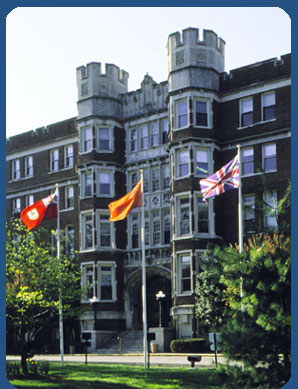| Women's Intellectual Contributions to the Study of Mind and Society Students, as part of an advanced seminar, examined and wrote about the lives of these women,
their intellectual contributions, and the unique impact and special problems that being female had
on their careers. |  |
| For information about referencing this paper - Click Here |
Naomi Norsworthy
(1877-1916)
Early Years
Naomi Norsworthy was born in 1877 in New York City. Naomi's mother migrated from England two years prior to marry an engineer, who was also from England. Naomi's paternal grandmother hoped to have a granddaughter so that she could look after and support her mother just as Naomi's mother had done for her. Naomi's mother even went as far as to convert to the same religious faith as her. Naomi's mother played a significant role in her life. Selfless duty and devotion were ingrained in her. She was also trained in domestic skills.
Growing up, Naomi greatly enjoyed playing with her two younger brothers. Her father even nicknamed her "boy". Naomi's mother felt that all of her children should have educational advantages (Scarborough & Furumoto 191).
Education
At the age of eight Naomi attended school in Rutherford New Jersey. Because of her desire to teach, at age fifteen she went on to study at the New Jersey State Normal School at Trenton. At eighteen years of age she had completed her schooling and began teaching third grade in Morristown, New Jersey. Being that Naomi was so ambitious, she enrolled in Columbia University's Teachers College in New York in 1899 (age 22). She was appointed student assistant in psychology which was the beginning of sixteen years of service. Naomi earned her BS in 1901 and her Ph D in 1904.
Career
She taught a majority of the courses in psychology, both graduate and undergraduate. Besides teaching, she was an adviser of women and was deeply involved in aiding the student social and religious organizations at Teachers College and Columbia University. She did have offers from other institutions but felt she could have closer contact with students at Teachers College.
Teaching was not always easy for Naomi. She often had to substitute for the head of her department. She once overheard a student remark that "I for one did not come to Teachers College to be taught by a chit of a girl". She put the comment behind her and at the end of the class the student told her that he enjoyed the session.
Naomi did not let the intimidation of the male students stop her. There once was an instance where a student had strongly been advised to sign up for Dr. Norsworthy's class. He later went to the dean saying that he had been cheated when he found that the professor was a "slip of a woman". The dean retorted said that he was under a false impression and said "You will find her one of the strongest men on our faculty. "Go to her class a few times and see if you don't find her so" (Scarborough & Furumoto 193). The student did eventually return to the dean to confirm the dean's opinion of Dr. Norsworthy.
Later Years
During Naomi's career she juggled the duties of daughter at home, schooling, as well as her career. She took over all the duties of her family's household to lighten the burden on her mother. She would fix breakfast and dinner for her mother and clean the house. All the while maintaining her career. Naomi attended to her mother during her two-year struggle with terminal cancer. By the time of her mother's death, she herself had become seriously ill with cancer. She was able to teach for one more year. She was then forced to take leave and later died in December of 1916, at the tender age of 39. Soon after Naomi's death a colleague of hers completed a children's educational text called The Psychology of Childhood in 1918 (Scarborough & Furumoto 194).
References
- Scarborough, E., & Furumoto, L. (1987). Untold lives: The first generation of the American women
psychologists. New York: Columbia University Press.
Back to Women's Page
